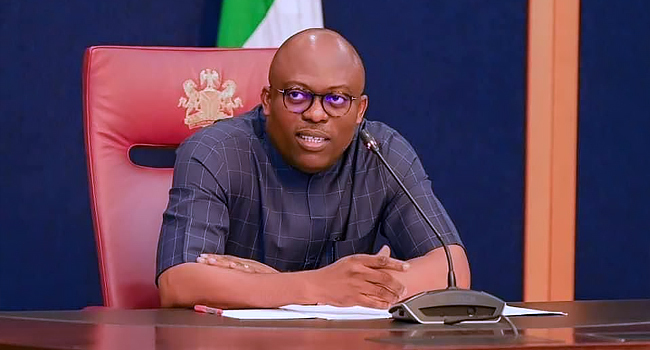Six months. That was the stretch when Rivers State was held in limbo. The assembly chambers quieted, the halls of power were quietly occupied, and a once-vibrant democracy seemed to hibernate under a state of emergency. People watched, waited. Businesses wondered. Families asked: when will normal return? When will the voice of Rivers State echo again?
When the emergency rule was lifted and Governor Siminalayi Fubara returned, many saw an opportunity— not simply for restoration, but for reckoning. What had these six months taught him, the governor asked? What changed, in Rivers, in leadership, in trust? Because for many residents, the hardest thing about the suspension wasn’t just absence of governance—it was the fear that it could happen again.
These months were not just a pause of power—they became a mirror. And Fubara says he looked long into it. He says he saw weakness, expectation, betrayal, resilience, and potential all mixed up in the same reflection.
Here are five lessons Fubara claims he’s learned in that storm—and what Rivers people should expect, demand, and refuse in the months ahead.
What Fubara Says He’s Learned
1. The Fragility of Political Support & Loyalty
There were significant political maneuvers during his suspension. Tensions with former allies (notably Wike), with some politicians ready to defect, and the delay in governance revealed that political loyalty is often provisional.
Fubara likely has learned that allies can shift quickly, and that promises made during the quiet moments of campaign don’t always hold when crisis hits. He now must govern knowing that his base isn’t unconditional.
2. Importance of Revenue Independence & Financial Preparedness
Fubara in earlier speeches has emphasized boosting Internally Generated Revenue (IGR) and reducing over-reliance on federal allocations. Projects like matching funds, improving business-friendly policies, and boosting economic investment in Rivers have been key.
The emergency likely exposed how vulnerable the state is when funds are controlled externally or delayed. He’s seen how federal control or external interventions can limit what a governor can do without financial autonomy.
3. The Need for Strong Institutional Checks & Collaboration
There have been calls from elders, opposition actors and civil society (e.g. PANDEF, etc.) for sober reflection, for verifying what happened in the emergency, for the legislature to resume oversight, and for governance to be transparent.
4. Visibility of Development & Projects as a Measure of Governance
Before and during the emergency, some of Rivers State’s projects were halted or slowed; Fubara has frequently compared his achievements in a few months to what was done over years under previous administrations.
5. People Crave Not Just Power, but Ethical, Humble Governance
There have been many public statements praising humility, simplicity, inclusion, and governance being for the people, not spectacle. Also, praise from members of the public and opposition for his respectful demeanor, involving elders, seeking cooperation.
When Learning Becomes Delivering
What Fubara says he’s learned matters. But Rivers won’t celebrate lessons. It will demand results. Because reflection is only meaningful when it leads to change.
Also Read: Fubara Speaks: After Emergency Rule, Here’s What Rivers State Plans Next
If the last six months were Rivers State’s trial in silence — then the next months are the testimony. Do the people see roads repaired? Do hospitals function? Do kids return to class? Are their voices heard?
Let’s hope that what Fubara has learned becomes what Rivers feels. Let’s hope that the lessons don’t just echo — they act.







